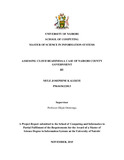| dc.contributor.author | Jeyapaul, Christinal A B | |
| dc.date.accessioned | 2016-01-04T11:18:27Z | |
| dc.date.available | 2016-01-04T11:18:27Z | |
| dc.date.issued | 2015 | |
| dc.identifier.uri | http://hdl.handle.net/11295/94145 | |
| dc.description.abstract | Background: The CCU can be a challenging and traumatizing place for patients’ family members, and they are prone to develop PTSR and at risk for PTSD.Anxiety and depression was present in 72.7% of family members and 84% of spouses as per South African Study and this problem has been inadequately addressed in Kenya and sub-Saharan Africa.
Objective: Toassess post-traumaticstress reactions among family members of CCU patients at KNH
Design: A cross-sectional descriptive study
Methods: Quantitative analysis was carried out by administering questionnaires with IES-R standard tool to sixty family members of CCU patients and the results were analyzed by SPSS and for qualitative analysis, in-depth interview was conducted to family members of CCU patients and the results were analyzed by NVIVO software .Descriptive analysis was done using mean, frequency and proportion .Chi-square test (p<0.05) was computed to establish the factors associated with PTSR.
Results: The mean IES-R score was 60.5 (SD 18.4). Using a cut-off of 33 out of the total maximum score of 88 , it was determined that 55 (91.7%) family members had scores associated with severe symptoms of PTSR.It was found out that the family members who received social support from respective family were less likely to report severe PTSR (84.4%) compared to those who did not receive any support from family (100%) (p = 0.029) .Family members of CCU patients who had National Health Insurance Fund (NHIF) have less severe PTSR (85.3%) compared to those who did not have NHIF (100%) (p=0.041).
Conclusion: It is evident that majority of family members of CCU patients do experience severe symptoms of PTSR and it‘s vital to understand and explore family member‘s stressful experience, in order to be able to assess and reduce the risks associated with PTSR.
Recommendation: Family members need to be assessed for PTSR in order to render the appropriate interventions, and great need for future research to know as which interventions can help family members to reduce psychological symptoms. | en_US |
| dc.language.iso | en | en_US |
| dc.publisher | University of Nairobi | en_US |
| dc.title | Assessment of post traumatic stress reactions among family members of Critical Care Unit patients | en_US |
| dc.type | Thesis | en_US |
| dc.description.department | a
Department of Psychiatry, University of Nairobi, ; bDepartment of Mental Health, School of Medicine,
Moi University, Eldoret, Kenya | |

